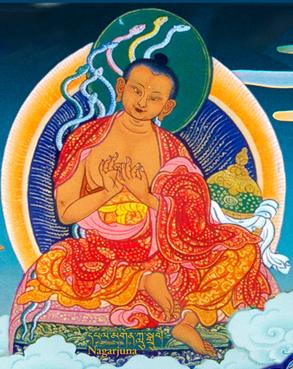Nagarjuna: Difference between revisions
No edit summary |
No edit summary |
||
| Line 12: | Line 12: | ||
==External Links== | ==External Links== | ||
*[http://www. | *[http://www.lotsawaschool.org/nagarjuna_quotes.html Important quotes from the writings of Nagarjuna] | ||
*[http://www.berzinarchives.com/web/en/archives/approaching_buddhism/teachers/lineage_masters/biography_nagarjuna.html A brief biography of Nagarjuna by Alexander Berzin] | *[http://www.berzinarchives.com/web/en/archives/approaching_buddhism/teachers/lineage_masters/biography_nagarjuna.html A brief biography of Nagarjuna by Alexander Berzin] | ||
*[http://www.lotsawahouse.org/nagarjuna.html Nagarjuna Series on Lotsawa House] | |||
[[Category:Historical Masters]] | [[Category:Historical Masters]] | ||
[[Category:Seventeen Nalanda Masters]] | [[Category:Seventeen Nalanda Masters]] | ||
[[Category:Eight Vidyadharas]] | [[Category:Eight Vidyadharas]] | ||
Revision as of 06:57, 8 May 2008

Nagarjuna (Skt. Nāgārjuna; Wyl. klu sgrub) - one of the six great commentators (the ‘Six Ornaments’) on the Buddha’s teachings, the great scholar Nagarjuna (c.150-250) is revered as an unsurpassed master by all Buddhist schools. His teachings provide the foundation for the Madhyamika School, which propounds the ‘Middle Way’ philosophy, accepted as the highest view within the sutrayana. He was also the revealer of the Prajñaparamita Sutras, the core teaching of the second turning of the wheel of the Dharma. He is also counted among the eighty-four mahasiddhas.
Collections of Writings
Nagarjuna's writings mainly employ reasoning in order to clarify the view and the conduct of the buddhist teachings. His writings are categorized into three collections, corresponding to the three turnings of the wheel of the dharma. These three collections are: